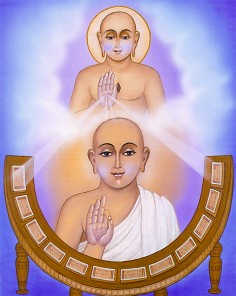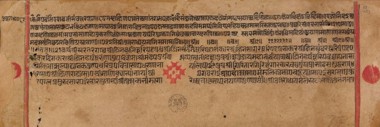Fourth Lecture: Impurity
You cannot prolong your life,[1] therefore be not careless; you are past help when old age approaches. Consider this: what (protection) will careless people get, who kill living beings and do not exert themselves? (1)
Men who adhering to wrong principles acquire wealth by evil deeds, will lose it, falling into the snares (of their passions) and being held captive by their hatred. (2)
As the burglar[2] caught in the breach of the wall perishes by the work the sinner himself had executed, thus people in this life and the next cannot escape the effect of their own actions. (3)
If a man living in the Saṃsāra does an action for the sake of somebody else, or one by which he himself also profits, then, at the time of reaping the fruit of his actions, his relations will not act as true relations (i.e. will not come to his help). (4)
Wealth will not protect a careless man in this world and the next. Though he had seen the right way, he does not see it, even as one in the dark whose lamp has suddenly been put out. (5)
Though others sleep, be thou awake! Like a wise man, trust nobody, but be always on the alert; for dangerous is the time and weak the body. Be always watchful like a Bhāruṇḍa[3] bird! (6)
A monk should step carefully in his walk (i.e. in his life), supposing everything to be a snare for him. First he must bestow care on his life till he wins the stake (viz. enlightenment), and afterwards he should despise it, annihilating his sins. (7)
By conquering his will, (a monk) reaches liberation, as a well-broken horse which is clad in harness (goes to battle). Be watchful in your young years; for thereby a monk quickly obtains liberation. (8)
“If he does not get (victory over his will) early, he will get it afterwards”; such reasoning[4] presupposes the eternity of human life. But such a man despairs when his life draws to its close, and the dissolution of his body approaches. (9)
One cannot quickly arrive at discernment; therefore one should exert one’s self, abstain from pleasures, understand the world, be impartial like a sage, and guard one’s self: (thus) never be careless. (10)
A Śramaṇa who again and again suppresses the effects of delusion, and controls himself, will be affected in a rough way by external things; but a monk should not hate them in his mind. (11)
External things weaken the intellect and allure many; therefore keep them out of your mind. Keep off delusion, remove pride, do not practise deceit, leave off greed. (12)
Heretics who are impure and vain, are always subject to love and hate, and are wholly under the influence (of their passions). Despising them as unholy men, desire virtues till the end of your life. (13)
Thus I say.
 Ganadhar Sudharma Swami
Ganadhar Sudharma Swami
